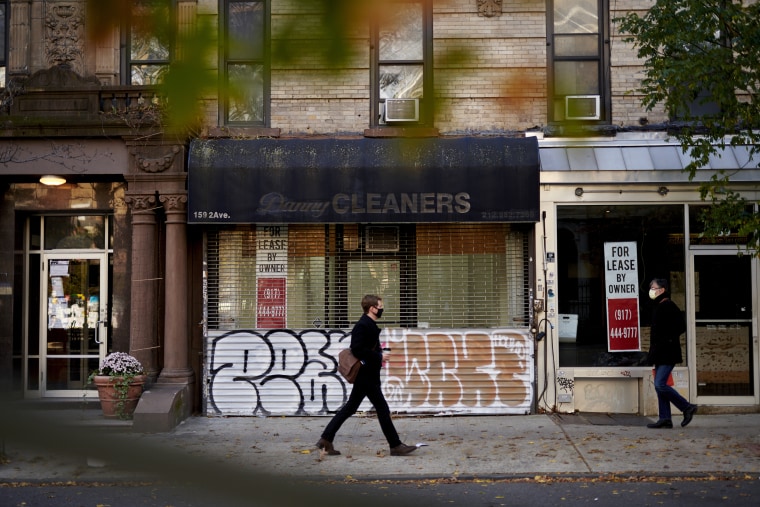As office workers and other employees enter their 12th month of working from home — or sofa, or bed — the future of the dry cleaning industry continues to hang by a thread.
“It’s a desperate feeling knowing everything is on the line and your business is under water and there’s nothing you can do about it," said Stephen Jaramillo, who owns Custom Cleaners in Pennington, New Jersey.
He bought the business in summer 2019 for half a million dollars, believing it was a “proven-out business model."
Now, with corporate America mostly favoring sweatpants and leisurewear for their days at home, his dry cleaning business is down 50 percent and he is running a deficit of $6,000 every month, he said.
“Being able to work from home is the biggest enemy. We depend on people going to the office."
Over the last year, Jaramillo has sought out financial assistance from the Small Business Administration, as well as forbearance on his mortgage and student loan payments and has drastically cut payroll. Still, even after pivoting his business model during the pandemic, he continues to struggle. “Nothing has made my business whole since Covid,” Jaramillo said.
And yet, he's one of the lucky ones. One in six dry cleaners have had to close their doors or file bankruptcy, the National Cleaners Association confirmed to NBC News.
“We're hoping that once people get vaccinated and everybody feels more comfortable being out, people are going to want to dress up,” said Dawn Avery, spokesperson for the NCA.
It could be a while. The latest data from the Centers for Disease Control and Prevention shows that 90 percent of Americans are yet to be vaccinated.
To survive, many dry cleaners have pivoted to disinfection services, alterations and wash-and-fold-services. Some have even reached out to elderly customers to assist them with their groceries. But, as the majority of white-collar workers continue to work from home, Jaramillo and industry experts anticipate the stagnation will continue.
Richard Thum, owner of Five Star Cleaners in San Antonio, Texas, had to furlough 30 percent of his staff after sales began to plummet. At one point, sales dropped by 60 percent. One year later, he’s now operating at 40 percent of what he would during a normal cycle.
“It’s the worst thing in the world having to let go of your employees who are just trying to make a decent living,” said Thum, who has been in the dry cleaning industry for four decades.
While he is beginning to feel optimistic after Texas Gov. Greg Abbott gave the green light for businesses to return to 100 percent capacity, even when Covid restrictions are lifted, not everyone will be returning to their 9-5 office job.
According to the Pew Research Center, over 50 percent of employees would like to continue working from home, even after the coronavirus outbreak ends. As a result, corporate America is rethinking what to do with its office space, with many companies considering a hybrid workplace where employees rotate in and out of the office.
Since the dry cleaning industry is tied to the success of other sectors, and if consumer interest does not increase soon, many more dry cleaners will have to permanently shut down, according to the Dry Cleaning and Laundry Institute.
“We estimate that before this is all over, within the next 18 months up to 30 percent of dry cleaners can close,” said Mary Scalco, CEO of the Dry Cleaning and Laundry Institute.
Albert Lee, who owns J’s Cleaners in Manhattan, continues to operate at a monthly deficit of $10,000. Lee, who bought his dry cleaning business 35 years ago, has lived through several hurdles — including the September 11 attacks — but never imagined his business would take the toll it did during 2020.
Lee has furloughed 50 percent of his staff and has cut down his operating hours because demand for his business is still down by around 70 percent. Like other dry cleaning businesses, Lee doesn’t expect business to increase until corporate America returns to the office.
“Being able to work from home is the biggest enemy. We depend on people going to the office,” Lee said.
